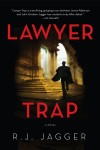Lawyer Trap by R.J. Jagger
 By Gary Kriss
By Gary Kriss
If silence is indeed golden, attorney R. J. Jagger may be one of the world’s richest men. And while lawyers tend to be circumspect, Jagger, who practices in Colorado, makes Miho seem like SinCity’s most garrulous gasbag.
Which is just as well, since sawing off a woman’s head is probably cause for disbarment in the Centennial State.
And beheading’s just a starter.
The full litany of grisly crimes can be found in LAWYER TRAP, Jagger’s latest novel, which is being released on November 16 by Pegasus. Jagger might be close-mouthed about his personal life, but he’s perfectly willing to let everything all hang out in his books.
LAWYER TRAP again features Nick Teffinger, the coffee-swilling Denver homicide detective who’s managed to make it through a slew of other hard-nosed Jagger thrillers, often battered but always breathing. This time he crosses paths with newly licensed attorney Aspen Wilde, an associate at Denver’s largest law firm. who’s out to find the killer of another female associate.
Wilde’s quest leads to a complex web of murders involving several different women killed in very different ways. It also leads to Teffinger, who is hot on—and also hot on the investigative trail of—a beautiful, kinky suspect—trying to determine whether she’s a murderer, a target or something else altogether. Pieces repeatedly come together, then fall apart as Aspen and Teffinger dig for answers, while also digging themselves a dangerous hole that threatens to become their grave.
Actually, this won’t be the first appearance of LAWYER TRAP, although it will be the first in a hardcover edition. It had an earlier incarnation, as an e-book and, in Jagger’s own chronological ordering of Nick Teffinger thrillers, which starts with WITNESS CHASE, it’s the third of 12 books.
Not that it matters.
“The order is unimportant,” Jagger says. “Each book is a standalone thriller. There is no relation forward or backward from any book to another. Although Nick Teffinger is a recurring character in most of them, he is reintroduced in each one and is always the same age—34. So, you can pick up any one and read it first with no problem.”
For those familiar with the Teffinger novels, LAWYER TRAP again uses three alternating points of view—a detective, a lawyer and an antagonist— a technique Jagger devised to hold the reader’s interest.
“Boring the reader, ever for as short a beat as a paragraph or a few sentences, is the absolute worst thing an author can do,” Jagger states. “Straight lines are boring, jagged ones aren’t. So, what I do is write from three points of view, alternating them 1, 2, 3 throughout the book. The story thus jags from one character to another and is more resistant to boring for that reason alone. On top of that, the characters operate in POV mode, which helps the readers identify with them, even the bad guy. I always present a main antagonist as one of the POV characters. That’s because the protagonist can only be as good as what he’s up against, and the reader needs to clearly see what he’s up against to appreciate the depth of his challenge.”
Evident, too, in LAWYER TRAP is Jagger’s pared-down style. “Being a lawyer taught me to leave out the part the jury will roll its eyes at or flat-out not listen to,” Jagger says. “The same principle applies to writing.”
“Take the simplest words you can find and then arrange them in the tightest order you can,” he continues. “Keep the flashlight on the story, not the storyteller. Never over-explain or talk down to the reader. Instead, give them the absolute minimal information they need and then dare them to keep up with you.”
LAWYER TRAP contains something else common to the Teffinger novels: large dollops of sex and violence. Some have criticized Jagger for this, but he remains unfazed. He doesn’t particularly care whether people like his books or not, nor does he harbor any pretensions about them.
“I treat every book as a throwaway, meaning if it works, fine, but if it doesn’t, no big deal—there are more words where those came from,” he explains. “Treating the book as lump of clay rather than a fine marble sculpture lets me move my hands where they need to go.”
Indeed, Jagger seems to relish tweaking convention. Asked about the writing rule he breaks most often, he doesn’t hesitate, citing “the universal rule is that writers must be readers.”
“I haven’t read more than a handful of books in the last 30 years,” Jagger says. “If I had the time, I might, but even then I have to admit that overall books just don’t do much for me. I’d rather watch the movie.”
While he may not read books, he certainly writes them at a rapid clip, not just the Teffinger series, but another one involving private investigator Bryson Wilde and set in—to use Jagger’s words—“an edgy 1952 world where the dames are dangerous, cigarettes dangle from ruby-red lips and the nights are hotter than whiskey-soaked jazz.”
Jagger refers to this as his “Noir” series, although he tends to see all his works as fundamentally noir in nature, despite the Teffinger works being classified as “lawyer thrillers.” Indeed, Jagger finds most novel classifications meaningless. He notes, for example, “the only difference between a mystery and a thriller is the number of bodies.”
If Jagger has qualms about genre pigeonholing, he doesn’t feel the same way about the one genre-related organization he chooses to belong to, the International Thriller Writers. His reasons are specific and personal.
“Most writer organizations evolved in the traditional era of publishing and correspondingly limited their admissions to ‘traditionally’ published authors,” he explains. “The ITW was the first organization to offer an exception to that rule and allow a non-traditional writer to apply under what is basically an equivalency formula. Having only published through my own publishing company since the start, I was not—in the earlier days—traditionally published yet. I applied to ITW through the exception rule expecting full well to be told, ‘Thanks, but …’ the opposite happened and—Voila!—here I am.”
To Jagger, “that speaks volumes as to the ITW and the forward thinking and non-prejudicial attitudes that drive the organization.” In his mind, “it is that kind of philosophy, infrastructure and leadership that positions the organization for both current and future success.”
With that quasi-intimate revelation, was Jagger now ready to divulge anything more about himself, beyond what you find if you google his name, which is nearly nothing?
Instead, he points to the answer found on the blog site for his books: “For those who care to know, I play the drums, try cases in court, get into more trouble than I get out of, sing to any Beatles or Beach Boys song that comes on the radio, and occasionally ponder who’s hotter, Brittany in ‘Womanizer’ or Shakira in ‘Hips Don’t Lie.’ That, plus I pound thrillers out at the keyboard every now and then. That’s about it.”
Come on, R.J., just one little detail. Please.
A pause, then, finally, a concession of sorts , which would bring a smile to Nick Teffinger’s face.
“If I were a drink, I’d be whatever Shakira drinks, or Beyoncé, either one.” He confesses, and then becomes effusive. “Or Brittney, let’s not forget her. Oh, Gaga too for that matter.”
And, with that, the defense rests.
*****
 R.J. Jagger is a Colorado attorney and the author of over fifteen thrillers. He is a member of the International Thriller Writers.
R.J. Jagger is a Colorado attorney and the author of over fifteen thrillers. He is a member of the International Thriller Writers.
To learn more about RJ, please visit his website.
- The Miser’s Dream by John Gaspard - November 1, 2015
- Critical Condition by Richard L. Mabry, M.D. - March 31, 2014
- The Last Dead Girl By Harry Dolan - January 1, 2014
